 Petzlover
PetzloverBoth Miniature English Bulldog and Pugnaces Britanniae are originated from United Kingdom. Miniature English Bulldog may grow 40 cm / 15 inches shorter than Pugnaces Britanniae. Miniature English Bulldog may weigh 92 kg / 202 pounds lesser than Pugnaces Britanniae. Miniature English Bulldog may live 3 years less than Pugnaces Britanniae. Miniature English Bulldog may have less litter size than Pugnaces Britanniae. Miniature English Bulldog requires Moderate Maintenance. But Pugnaces Britanniae requires Low Maintenance
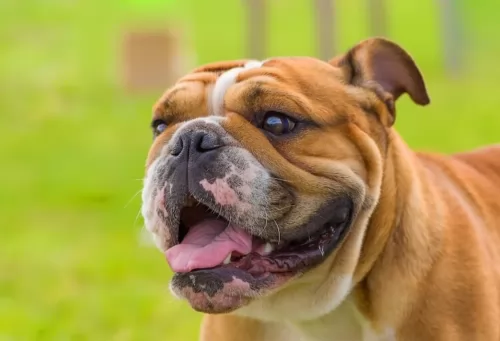 The Miniature Bulldog is such a cute little dog, hailing from England in the 18th and early 19th centuries. The exact development of the dog is unclear and it seems as though the breeders weren’t working together and were working in two different directions.
The Miniature Bulldog is such a cute little dog, hailing from England in the 18th and early 19th centuries. The exact development of the dog is unclear and it seems as though the breeders weren’t working together and were working in two different directions.
There is a lot of debate about the very name ‘miniature’ too because some breeders gave this name to a hybrid mix of a Pug and Bulldog. It seems some breeds were created by crossing English Bulldogs with French Bulldogs to decrease their size. Certainly the origins for the Miniature Bulldog are unknown and there isn’t one particular breeder who can be credited with developing the breed.
Because the Miniature Bulldog is a hybrid breed, it isn’t accepted by the AKC, but it is accepted by the American Canine Hybrid Club as well other registries.
Pugnaces Britanniae is a dog which is now extinct. There isn't certainty surrounding the origins of the dog but it is thought they descended from dogs brought to Britain way back in the 6th century BC already.
These are ancient dogs, and when you do research you find references dating back to centuries ago. In fact when you read of the Roman conquest of Britain you read of huge dogs, which the Romans referred to as Pugnaces Britanniae.
It is believed that the English Mastiff descended from the ancient Alaunt and Pugnaces Britanniae and that the dog was used as a war dog.
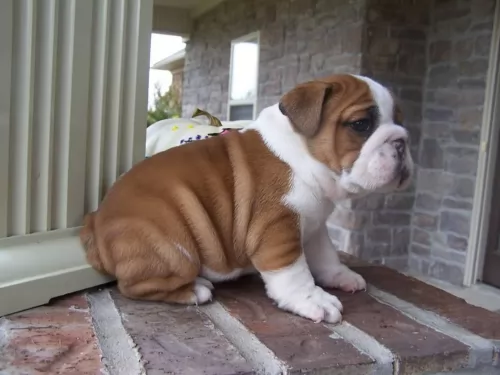 Because the Miniature Bulldog is a cross between two purebred breeds – the Pug and the English Bulldog. You can expect different looks and characteristics from each breed.
Because the Miniature Bulldog is a cross between two purebred breeds – the Pug and the English Bulldog. You can expect different looks and characteristics from each breed.
Your mini Bulldog is a small breed dog standing between 25 and 35cm male and female and weighing between 11 and 18kg. The average litter size for these dogs is about 4 puppies.
The Miniature Bulldog has a short coat which sheds moderately and that comes in different colors such as tan and white, brindle, with black and grey also having a show in.
The Miniature Bulldog is a social, friendly breed who is able to get on well with all members of the family, including children and pets in the home. His very stature makes it that he isn’t the most active of dogs, but nonetheless you still want to exercise him and take him for walks to avoid obesity.
As with all dogs, training and socialization are imperative because this is a strong-willed dog who wants to go his own way.
The Pugnaces Britanniae was a huge dog standing at roughly 67 to 75cm and weighing 52 to 110kg.
He was a heavily built dog, a Mastiff type dog that had a large head, broad muzzle with fairly loose skin around the mouth, brown eyes, a broad back and rump, muscular legs and floppy ears with a long tail. In fact the Mastiff, thought to have descended from the ancient Alaunt and Pugnaces Britanniae, gives you an idea of what the dog looked like. He no doubt has a short, smooth coat available in fawn, tan or brindle and with the black mask.
The Pugnaces Britannia was a naturally aggressive dog so it is to be expected that he wouldn’t automatically have been a good family dog, possibly being aggressive around children and other dogs. They were intelligent and were no doubt taught some simple commands.
They were also very territorial dogs, wanting to instinctively chase and attack unknown people and animals. They were strong minded, confident, loyal ad loving dogs towards their owners, being protective of them, wanting to please them.
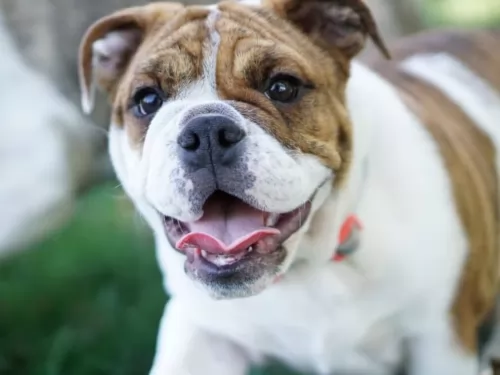 You’ll love having one of these entertaining, friendly dogs by your side. He is docile, social, fun and a bit stubborn too but he is able to get on well with children in the home as well as with other pets.
You’ll love having one of these entertaining, friendly dogs by your side. He is docile, social, fun and a bit stubborn too but he is able to get on well with children in the home as well as with other pets.
He can adapt to life in the city as well as in the countryside as he doesn’t require too much exercise.
Take special care of him and he’ll make you a splendid family pet.
The Pugnaces Britanniae may well have been a large dog and quite imposing to look at but he was in all likelihood a good-natured pet who got on well with his family members, being loyal and loving if brought up correctly.
Long ago dog training and socialization didn’t exist but a large dog like this would have to be socialized and trained to become obedient and an amicable all-rounder.
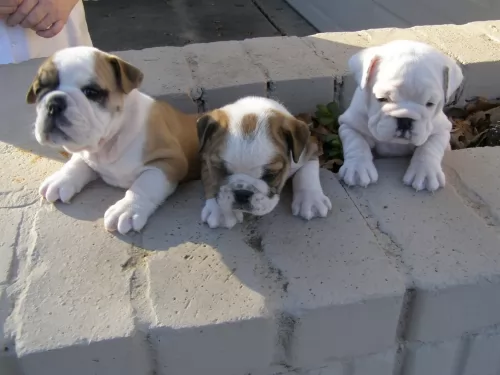 Unfortunately the origins of the Miniature English Bulldog are not 100% clear and therefore other important information isn't readily available.
Unfortunately the origins of the Miniature English Bulldog are not 100% clear and therefore other important information isn't readily available.
These dogs are always prone to breathing and nasal abnormalities because of the shape of their faces as well as being prone to heart deficiencies. Snoring, grunting and quite a bit of panting is part and parcel of the mini English Bulldog.
They’re also prone to overheating, cherry eye and hip dysplasia. It is most unlikely that your Miniature English Bulldog is going to get any of these illnesses and the good news is that he can live to be up to 12 years of age.
The Pugnaces Britanniae could live to 10, 11 or 12 years of age with good care. Large Mastiff type dogs like this would have had to watch out for common canine diseases such as hip dysplasia, cancer and bloat.
In those days, no screening tests were available for health problems like this. Gastric dilatation volvulus or bloat is a common health issue with large, deep chested dogs where the stomach fills with gas and the stomach twists. Its a life threatening disease.
Canine heart disease is another serious health issue with these mastiff type dogs. Early stages with heart disease show there may well be no symptoms at all. However, as the heart disease progresses towards congestive heart failure, the dog will have symptoms such as fatigue, difficulty with breathing, weight loss, a distended abdomen and coughing.
A dog with symptoms like this would have to see a vet immediately.
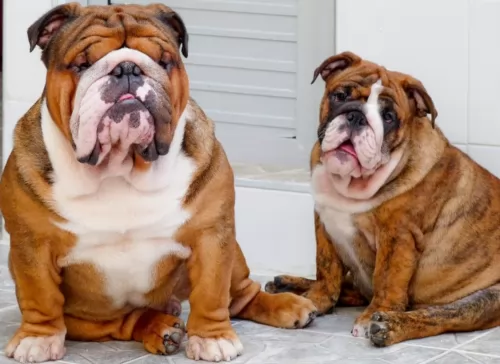 Feeding the Miniature English Bulldog is hugely important. It is imperative that he doesn't become obese. Buy the best dog food there is and see to it that he also gets some home-made food. Chop up boiled chicken, brown rice ad vegetables for your pet and mix occasionally into his dry kibble.
Feeding the Miniature English Bulldog is hugely important. It is imperative that he doesn't become obese. Buy the best dog food there is and see to it that he also gets some home-made food. Chop up boiled chicken, brown rice ad vegetables for your pet and mix occasionally into his dry kibble.
Dogs love simple food – their stomachs can’t cope with different foods. They appreciate consistency with uncomplicated but nutritious foods. The bulldog is a dog which can easily overheat, so make sure he has constant access to fresh cool drinking water. On a hot day you can even use a spray bottle and allow some spray mist sprayed into his face to cool him down.
The Mini English Bulldog is a dog that sheds so you will need to brush him at least twice a week to get rid of loose hair.
Check around his eyes and inside his ears for infection.
Brush his teeth 2 or 3 times a week to get rid of plaque so as to prevent dental decay which can be detrimental to his health.
His face and body have wrinkles, making him more susceptible to skin allergies and you’ll need to keep your eye open for these as they can be terribly painful and frustrating for your pet.
Keep his nails trimmed.
He is neither sleek, agile or quick and you can see just by looking at him that he isn’t designed for being sporty. A slow walk every day will be enough for him as well as some easy-going games inside.
The diets of ancient dogs were different to what they are today, as in those days there were no commercially manufactured dog foods. Dog owners in all likelihood tossed scraps to them which included starch.
Today a large dog such as the extinct Pugnaces Britannia would have no doubt been fed a high quality kibble from a leading brand and packed with minerals and vitamins specially formulated for a large dog breed.
Homemade food is also important, but not any kind of food – it has to be food which doesn’t upset the dog’s digestive system. Simple but nutritious food such as boiled chicken, brown rice or pasta, sweet potatoes, carrots and spinach is ideal for a dog, and when it is chopped up can be added twice a week to the dry kibble for a tasty, healthy treat.
Raw meat added in occasionally is also hugely beneficial. No dog should ever be without fresh, cool water constantly available.
As a short haired dog, the Pugnaces Britanniae would have required a brushing twice a week to rid the dog of loose hairs. Maybe in those days they didn’t check their dogs over to see that all was well, but today you would need to check the inside of the ears. If the insides were red, it could be a sign of an ear infection brought on by dampness, excess wax and dirt.
The eyes would need to be checked for discharge and the teeth checked a well. One rotten tooth can cause a lot of havoc. The nails of the dog would have had to be checked and clipped as well.
As a war dog, the Pugnaces Britanniae would have been fit. He is a big dog and while they require exercise such as walks and hide-and-seek type of games, he isn’t the kind of dog that would go running with you on a jog, as large, heavy dogs can overheat easily.